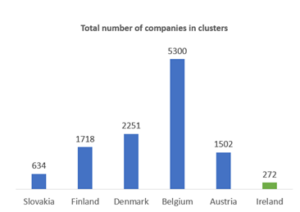In the first of our series on clusters in Ireland, we look at why clusters are important for the economy and show how they are having an impact. However, their potential is yet to be fully realised and although Irish clusters are high on innovation, they are low on engagement across the broader economy.
Over the next few weeks, we plan to show how that situation can be changed through planning, programme innovation, and technology.
The current cluster ecosystem in Ireland is a mix of good news and bad
Industry and business clusters are vital components of island economies like Ireland. They enhance innovation, competitiveness, and economic diversification while providing an ecosystem that attracts investment and talent. By fostering collaboration and knowledge exchange, clusters can help small economies stay relevant and competitive in an evolving global market.
In certain areas Irish clusters compare well against the European average and a selection of peer countries. They have an above average percentage of research organisations involved and a higher proportion of large companies, who are typically more productive and can bring new ideas into the broader cluster. The result is that the cluster ecosystem in Ireland is high on creativity and innovation.

Source: European Cluster Collaboration Report (2021) European Cluster Panorama NOTE: comparator countries were based on a combination of population and GDP
But the problem is how far this innovation is reaching into the economy, as smaller companies who make up the backbone of the Irish economy are less active in clusters. Ireland is well behind comparator countries in terms of the total companies involved in clusters, with only 272 companies involved compared to 1,1718 in Finland or 5,300 in Belgium(1).

Source: European Cluster Collaboration Report (2021) European Cluster Panorama
This figure of 272 companies from EU research feels unrealistic from our experience, and indeed other research would put it closer to 2,000 companies in Ireland involved in clusters(2). However, if the Europe-wide research underestimated numbers in Ireland it likely did the same elsewhere, and even the higher estimate of 2,000 is not great compared to other countries.
The general trend is clear, we need to get more Irish companies involved in clusters so that more people benefit from the innovation that is happening.
Why are clusters so important?
There are over 45 business clusters on the island of Ireland encompassing a range of sectors that reflect a modern, sustainable economy: Medtech, Fintech, Offshore Wind, Food and Drink, Advanced Manufacturing and many more. 53% of cluster organisations have a regional remit, 42% a national remit, and 5% have an All-Island (cross-border) remit.
Under Project Ireland 2040, the Irish Government identified an ambition to build sectoral clusters of Small and Medium Enterprises (SMEs) at national and regional levels. The development of all-island business networks has been considered to be a vital mechanism for optimising the island’s economic resources, particularly its knowledge resources, in support of a globally competitive island economy.
Looking at the advantages of clusters, and how they are contributing to economic success across Ireland helps explain why they present a strategic opportunity for the country.
| Advantage | Cluster theory | Cluster practice in Ireland |
| Export Growth and Internationalisation | By fostering cooperation and knowledge exchange, clusters can help businesses expand into international markets. The combined strength of the cluster’s companies can enable them to tackle global challenges, meet export demands, and compete more effectively on the global stage. | MedTech is a great Irish success story and there are at least five clusters in Ireland working in a sector where exports have grown from €8.5 billion in 2016 to €12.6bn in 2022. |
| Economies of Scale and Scope | Regional businesses often face limitations in terms of market size and access to resources. Clusters can help overcome these challenges by creating economies of scale and scope. Shared resources, infrastructure, and specialised services within the cluster can lead to cost efficiencies, collaboration, and shared innovation. | The Future Mobility Campus Ireland is an example of a shared resource that can drive the growth of the Connected and Autonomous Vehicle cluster in the Southwest. Supported by the likes of Jaguar Land Rover, CISCO, Seagate, and Shannon Airport, it provides access to resources and infrastructure that enable collaborations between large and small-scale enterprises, individual researchers, multi-national corporations, start-ups and Government entities. |
| Talent Attraction and Retention | Clusters often become talent magnets. Skilled workers are drawn to regions with vibrant business ecosystems, where they can find numerous opportunities for career advancement, collaboration, and networking. Retaining talent is essential for economic diversification and reducing brain drain from local economies. | In the Northwest, the development of the Killybegs Marine Cluster has already led to a collaboration with Atlantic Technological University. This aims to use Ireland’s only Blue Economy cluster as a centre of education and research to foster and retain the talent and skills for a high-potential sector of the future. |
| Innovation and Knowledge Sharing | Clusters foster innovation and knowledge sharing among businesses, research institutions, and other stakeholders. In a small economy, having companies from related industries nearby encourages the exchange of ideas, expertise, and best practices. This collaboration can lead to the development of new products, services, and technologies that can boost competitiveness and growth. | The financial services sector is not just about Dublin as the success of the Southeast Financial Services Cluster has shown. Its growth from just six companies to over 70 in less than three years has in large part been down to opportunities created for start-ups and established businesses to connect, share ideas, and foster innovation. |
| Attracting Foreign Direct Investment (FDI) | Industry clusters can be attractive to foreign investors seeking a particular expertise or sector concentration. When several companies from a related industry are present in a cluster, it signals a supportive ecosystem, which can be enticing for FDI. This influx of investment can drive economic growth, create jobs, and bring in new technologies and practices. | The growth of significant industry clusters in sectors such as life sciences, electronics, and financial services has been a driving force for investment in the regions in recent years, with Ireland’s southwest highlighted in the 2022 EY European Investment Monitor as an example of success in attracting foreign investment. |
What’s next?
According to the 2023 National Clustering Policy Report, 89% of Irish cluster organisations have been established for less than five years. While there have already been successes for clusters in Ireland, the journey is only beginning and OCO Global is excited to be part of that journey.
We are currently working with our economic development partners and leading the development of several cluster networks in Ireland, creating opportunities for sector mobilisation and growth across the country. Our global team of expert consultants are working to deliver international trade opportunities for these communities, support the learning and development of member companies, and are helping to mentor the leadership of these clusters, creating strategic and sustainable systems that will grow to contribute significantly to the Irish economy.
Want to learn more, get in touch about how we can support the development of business clusters in your region.



